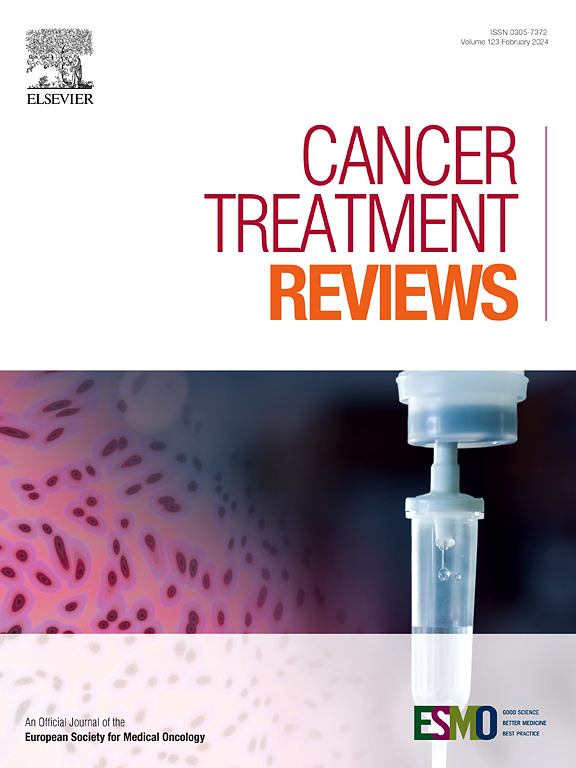二线治疗的关键决策因素:专家对cdk4 /6抑制剂后HR+/ her2转移性乳腺癌进展的见解
IF 10.5
1区 医学
Q1 ONCOLOGY
引用次数: 0
摘要
细胞周期蛋白依赖性激酶4/6抑制剂(CDK4/6i)治疗后,HR+/HER2-转移性乳腺癌的进展带来了重大的治疗挑战。内分泌治疗(ET)仍然是后续治疗的基石,但其有效性取决于对驱动治疗选择的临床和基因组因素的细微理解。例如,对先前CDK4/6i治疗的反应持续时间强烈预测对后续ET的敏感性。对一线治疗反应时间较长的患者可能从额外的内分泌策略中获益最多,而那些癌症进展迅速的患者通常需要其他方法。临床参数如疾病负担、内脏受累和合并症也指导治疗决策。低负担、无痛性疾病倾向于持续的ET,而侵袭性进展可能需要添加靶向药物或转向化疗。通过液体或组织活检进行的基因组分析应该是识别可操作突变和确保及时、个性化干预的组成部分。分子参数,如ESR1突变和PI3K通路改变,可以预测治疗反应,从而指导治疗选择。本综述强调了个性化、循证方法在cdk4 /6i失败后选择基于内分泌的治疗方法的重要性,利用临床见解和分子诊断来优化患者预后。本文章由计算机程序翻译,如有差异,请以英文原文为准。
Key decision factors in second-line therapy: Expert insights on HR+/HER2-metastatic breast cancer post-CDK4/6 inhibitor progression
The progression of HR+/HER2- metastatic breast cancer after treatment with cyclin-dependent kinase 4/6 inhibitors (CDK4/6i) poses significant therapeutic challenges. Endocrine therapy (ET) remains a cornerstone of subsequent treatment, but its effectiveness depends on a nuanced understanding of clinical and genomic factors that drive therapy selection. For example, the duration of response to prior CDK4/6i therapy strongly predicts sensitivity to subsequent ET. Patients with prolonged responses to first-line therapy may benefit most from additional endocrine strategies, whereas those with rapid cancer progression often require alternative approaches. Clinical parameters such as disease burden, visceral involvement, and comorbidities also guide treatment decisions. Low-burden, indolent disease favors continued ET, whereas aggressive progression may necessitate the addition of targeted agents or a shift to chemotherapy. Genomic profiling via liquid or tissue biopsy should be integral to identifying actionable mutations and ensuring timely, individualized intervention. Molecular parameters, such as ESR1 mutations and PI3K pathway alterations, can predict therapeutic response, thus guiding treatment selection. This review underscores the importance of a personalized, evidence-based approach to the selection of endocrine-based therapy post-CDK4/6i failure, leveraging clinical insights and molecular diagnostics to optimize patient outcomes.
求助全文
通过发布文献求助,成功后即可免费获取论文全文。
去求助
来源期刊

Cancer treatment reviews
医学-肿瘤学
CiteScore
21.40
自引率
0.80%
发文量
109
审稿时长
13 days
期刊介绍:
Cancer Treatment Reviews
Journal Overview:
International journal focused on developments in cancer treatment research
Publishes state-of-the-art, authoritative reviews to keep clinicians and researchers informed
Regular Sections in Each Issue:
Comments on Controversy
Tumor Reviews
Anti-tumor Treatments
New Drugs
Complications of Treatment
General and Supportive Care
Laboratory/Clinic Interface
Submission and Editorial System:
Online submission and editorial system for Cancer Treatment Reviews
 求助内容:
求助内容: 应助结果提醒方式:
应助结果提醒方式:


